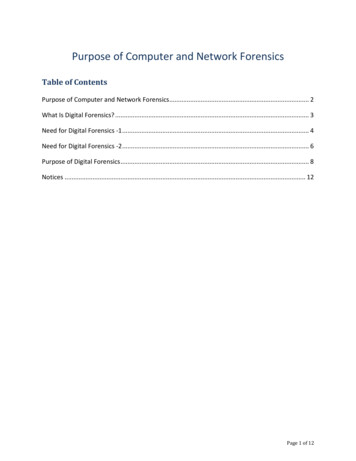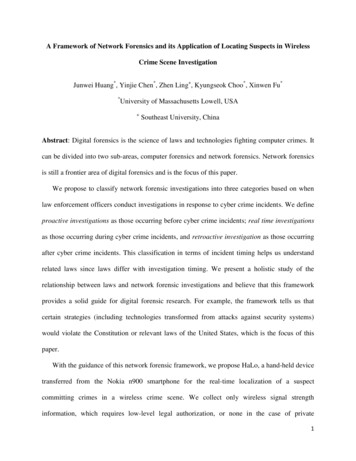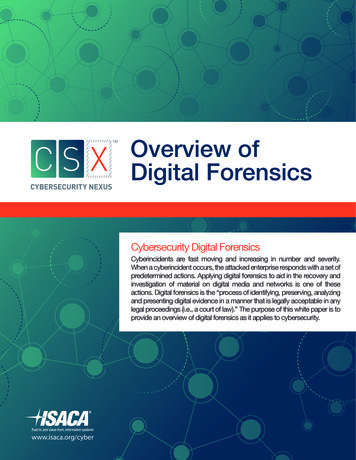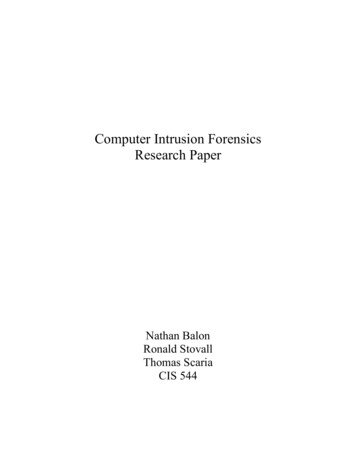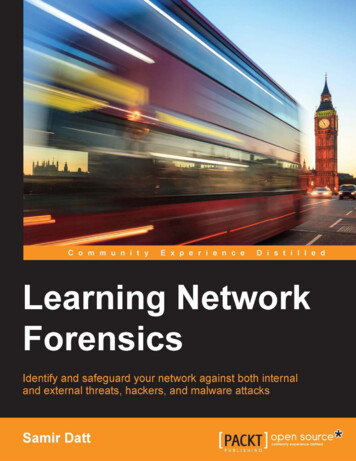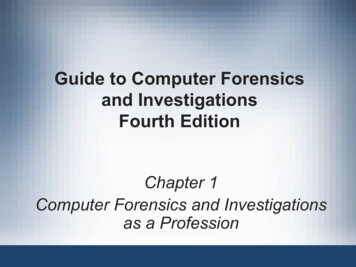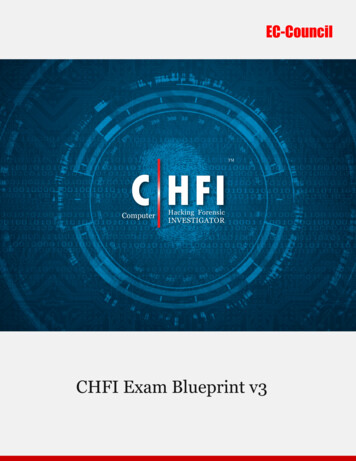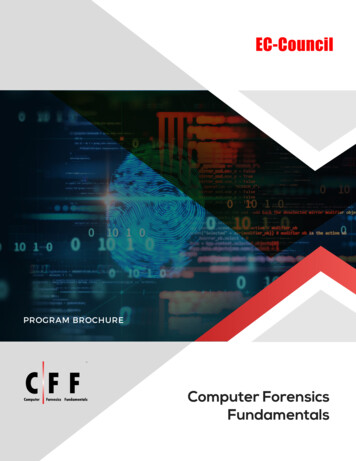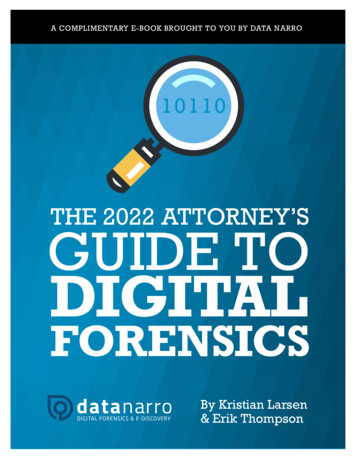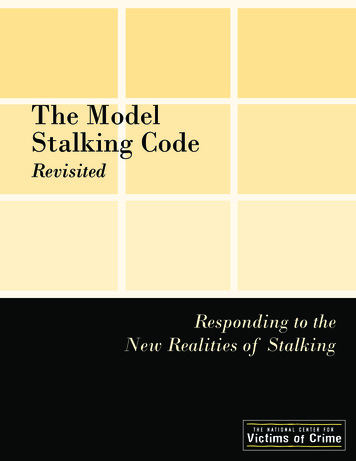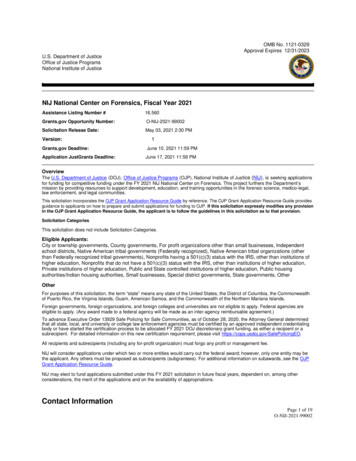
Transcription
OMB No. 1121-0329Approval Expires 12/31/2023U.S. Department of JusticeOffice of Justice ProgramsNational Institute of JusticeNIJ National Center on Forensics, Fiscal Year 2021Assistance Listing Number #16.560Grants.gov Opportunity Number:O-NIJ-2021-99002Solicitation Release Date:May 03, 2021 2:30 PMVersion:1Grants.gov Deadline:June 10, 2021 11:59 PMApplication JustGrants Deadline:June 17, 2021 11:59 PMOverviewThe U.S. Department of Justice (DOJ), Office of Justice Programs (OJP), National Institute of Jus tice (NIJ), is seeking applicationsfor funding for competitive funding under the FY 2021 NIJ National Center on Forensics. This project furthers the Department’smission by providing resources to support development, education, and training opportunities in the forensic science, medico-legal,law enforcement, and legal communities.This solicitation incorporates the OJP Grant Application Resource Guide by reference. The OJP Grant Application Resource Guide providesguidance to applicants on how to prepare and submit applications for funding to OJP. If this solicitation expressly modifies any provisionin the OJP Grant Application Resource Guide, the applicant is to follow the guidelines in this solicitation as to that provision.Solicitation CategoriesThis solicitation does not include Solicitation Categories.Eligible Applicants:City or township governments, County governments, For profit organizations other than small businesses, Independentschool districts, Native American tribal governments (Federally recognized), Native American tribal organizations (otherthan Federally recognized tribal governments), Nonprofits having a 501(c)(3) status with the IRS, other than institutions ofhigher education, Nonprofits that do not have a 501(c)(3) status with the IRS, other than institutions of higher education,Private institutions of higher education, Public and State controlled institutions of higher education, Public housingauthorities/Indian housing authorities, Small businesses, Special district governments, State governments, OtherOtherFor purposes of this solicitation, the term “state” means any state of the United States, the District of Columbia, the Commonwealthof Puerto Rico, the Virginia Islands, Guam, American Samoa, and the Commonwealth of the Northern Mariana Islands.Foreign governments, foreign organizations, and foreign colleges and universities are not eligible to apply. Federal agencies areeligible to apply. (Any award made to a federal agency will be made as an inter-agency reimbursable agreement.)To advance Executive Order 13929 Safe Policing for Safe Communities, as of October 28, 2020, the Attorney General determinedthat all state, local, and university or college law enforcement agencies must be certified by an approved independent credentialingbody or have started the certification process to be allocated FY 2021 DOJ discretionary grant funding, as either a recipient or asubrecipient. For detailed information on this new certification requirement, please visit https://cops.usdoj.gov/SafePolicingEO.All recipients and subrecipients (including any for-profit organization) must forgo any profit or management fee.NIJ will consider applications under which two or more entities would carry out the federal award; however, only one entity may bethe applicant. Any others must be proposed as subrecipients (subgrantees). For additional information on subawards, see the OJPGrant Application Resource Guide.NIJ may elect to fund applications submitted under this FY 2021 solicitation in future fiscal years, dependent on, among otherconsiderations, the merit of the applications and on the availability of appropriations.Contact InformationPage 1 of 19O-NIJ-2021-99002
For technical assistance with submitting the SF-424 and SF- LLL in Grants.gov, contact the Grants.gov Customer Support Hotline at800-518-4726, 606-545-5035, at Grants.gov customer support webpage, or email at support@grants.gov. The Grants.gov SupportHotline operates 24 hours a day, 7 days a week, except on federal holidays.For technical assistance with submitting the full application in DOJ’s Justice Grants System (JustGrants), contact the JustGrantsService Desk at JustGrants.Support@usdoj.gov or at 833-872-5175. The JustGrants Service Desk operates 5 a.m. to 9 p.m. ESTMonday - Friday and 9 a.m. to 5 p.m. Saturday, Sunday, and federal holidays.An applicant that experiences unforeseen Grants.gov or JustGrants technical issues beyond its control that prevent it from submittingits application by the deadline must email the National Criminal Justice Reference Service Response Center (Response Center) atgrants@ncjrs.gov within 24 hours after the application deadline to request approval to submit its application after the deadline.For assistance with any other requirements of this solicitation, contact the Response Center by telephone at 800–851–3420 or TTY:301–240–6310 (hearing impaired only) or by email at grants@ncjrs.gov. Response Center hours of operation are 10 a.m. to 6 p.m.ET Monday through Friday, and 10 a.m. to 8 p.m. ET on the solicitation close date.Submission InformationIn FY 2021, applications will be submitted to DOJ in a NEW two-step process.Step 1: Applicants will submit an SF-424 and an SF-LLL in Grants.gov at https://www.grants.gov/web/grants/register.html. Toregister in Grants.gov, applicants will need to obtain a Data Universal Numbering System (DUNS) and System for AwardManagement (SAM) registration or renewal.Step 2: Applicants will submit the full application including attachments in JustGrants at JustGrants.usdoj.gov.To be considered timely, the full application must be submitted in JustGrants by the JustGrants application deadline.OJP encourages applicants to review, the “How to Apply" section in the OJP Grant Application Resource Guide.Page 2 of 19O-NIJ-2021-99002
ContentsContact InformationProgram DescriptionOverviewStatutory AuthoritySpecific InformationGoals, Objectives, Deliverables, and TimelinePriority AreasFederal Award InformationAwards, Amounts and DurationsContinuation Funding IntentAvailability of FundsTypes of AwardsFinancial Management and System of Internal ControlsBudget InformationCost Sharing or Matching RequirementPre-agreement Costs (also known as Pre-award Costs)Limitation on Use of Award Funds for Employee Compensation: WaiverPrior Approval, Planning, and Reporting of Conference/Meeting/Training CostsCosts Associated with Language Assistance (if applicable)Eligibility InformationApplication and Submission InformationInformation to Complete the Application for Federal Assistance (SF-424)Standard Applicant Information (JustGrants 424 and General Agency Information)Proposal AbstractProposal NarrativeGoals, Objectives, Deliverables, and TimelineBudget and Associated DocumentationBudget Worksheet and Budget Narrative (Web-based Form)Indirect Cost Rate Agreement (if applicable)Financial Management Questionnaire (including applicant disclosure of high-risk status)Additional Application ComponentsCurriculum Vitae or ResumesTribal Authorizing ResolutionTimeline FormLetters of SupportResearch and Evaluation Independence and Integrity StatementBibliography/referenceAny tools/instruments, questionnaires, tables/chart/graphs, or mapsList of Individuals in the ApplicationHuman Subjects ProtectionPrivacy CertificateRequest to Use Incentives or StipendsDocumentation of “New Investigator” StatusConsortium/Contractual ArrangementsData Archiving PlanDocumentation of Advancing DOJ Priorities (if applicable)Documentation of High-Poverty Areas or Persistent-Poverty Counties (if applicable)Disclosures and AssurancesDisclosure of Lobbying ActivitiesDOJ Certified Standard AssurancesApplicant Disclosure of Duplication in Cost 11111111111111111111121212121212Page 3 of 19O-NIJ-2021-99002
DOJ Certifications Regarding Lobbying; Debarment, Suspension and Other Responsibility Matters; andDrug-Free Workplace RequirementsApplicant Disclosure and Justification – DOJ High Risk Grantees (if applicable)How to ApplySubmission Dates and TimeApplication Review InformationReview CriteriaReview ProcessFederal Award Administration InformationFederal Award NoticesAdministrative, National Policy, and Other Legal RequirementsInformation Technology (IT) Security ClausesGeneral Information about Post-Federal Award Reporting RequirementsFederal Awarding Agency Contact(s)Other InformationFreedom of Information and Privacy Act (5 U.S.C. 552 and 5 U.S.C. 552a)Provide Feedback to OJPPerformance MeasuresApplication 5161819Page 4 of 19O-NIJ-2021-99002
Program DescriptionOverviewThe Department of Justice is committed to advancing work that promotes civil rights, increases access to justice, supports crimevictims, protects the public from crime and evolving threats, and builds trust between law enforcement and the community.With this solicitation, NIJ seeks proposals from qualified applicants to establish and operate a National Center on Forensics at anaccredited university of higher education, with medical and law schools affiliated within the same university system, and inpartnership with a full-service and independent state department of forensic science with a medical examiner function, that is locatedin the same state as the partner accredited university.[1] The center is to provide medico-legal learning opportunities for medicalstudents to train as deputy medical examiners/coroners in underserved rural areas; provide forensic science and legal training todistrict attorneys, judges, and law enforcement; and develop opportunities, as appropriate, among the designated partners to benefitcurrent and future practitioners in the field.In the case of partnerships that will involve the use of federal award funds by multiple partnering agencies to carry out the proposedproject, only one entity/partnering agency may be the applicant (as is the case with any application submitted in response to thissolicitation); any others must be proposed as subrecipients.Statutory AuthorityDepartment of Justice Appropriations Act, 2021 (Public Law 116-260), 134 Stat 1182, 1257.Specific InformationNIJ is the federal government’s lead agency for forensic science research and development and the administration of programs thatimprove laboratory efficiency. The mission of NIJ's Office of Investigative and Forensic Sciences (OIFS) is to improve the quality andpractice of forensic science through innovative solutions that support research and development, testing and evaluation, technology,information exchange, and the development of resources for the criminal justice community.Forensic science is a multidisciplinary field involving the application of sciences such as physics, chemistry, biology, pathology,computer science, and engineering to matters of law. It, moreover, involves the methods and tools for collecting, preserving,examining, and interpreting evidence and the related educational/training programs that improve the science and the use of sciencewithin criminal justice agencies.This National Center on Forensics, under the guidance of NIJ, will be charged with establishing collaborations and/or partnershipswith agencies, including, but not limited to, institutions of higher learning with affiliate medical and law schools, publicly fundedforensic science laboratories, and statewide district attorneys’ associations to provide medico-legal learning opportunities for medicalstudents to train as deputy medical examiners/coroners in underserved rural areas; provide forensic science and legal training todistrict attorneys, judges, law enforcement, and others with an appropriate background; and develop opportunities, as appropriate,amongst the designated partners to benefit current and future practitioners in the field, such as forensic pathologists/medicalexaminers, forensic scientists, district attorneys, and law enforcement, or others as approved by NIJ. NIJ anticipates that thisNational Center on Forensics will collaborate with the FY2020 National Center on Forensics[2] to align goals, coordinate activities,maximize impact, and reduce redundancies, where appropriate and under the guidance of NIJ.Goals, Objectives, Deliverables, and TimelineProviding scientific and technical learning opportunities for the medico-legal community specifically targetedfor medical students, and focused on underserved rural areas. This National Center on Forensics will serve as acentralized innovative center to encourage engagement of medical students to train as deputy medicalexaminers/coroners in underserved rural areas. As outlined in the NIJ Needs Assessment of Forensic Laboratoriesand Medical Examiner/Coroner Offices Report to Congress in December 2019 (pg. 72), “The overwhelming needidentified by the medico-legal death investigator (MDI) community is the extreme national shortage of practicingboard-certified forensic pathologists (BCFPs) who are trained and qualified to perform forensic autopsies”.[3] Giventhe importance of this field and the difficulty of recruiting and retaining qualified individuals, this National Center onForensics is expected to develop methods by which to provide effective learning opportunities with a focus onincreasing the number of medical students pursuing a career in the forensic pathology field. This National Center onForensics is also expected to analyze these learning methods, to the extent practicable, to identify best practices.Furthermore, various scientific and technical trainings will be developed to include topics relevant to underservedrural areas (including tribal lands), covering topics which may include preparing, applying, achieving, and maintainingappropriate accreditation and/or specialty certifications (ABMDI, ABC, etc.); opioid/NPS response; and/or massfatality disaster management.Providing forensic science and legal training, information, and support to law enforcement, district judges,and other appropriate criminal justice agencies. This National Center on Forensics is expected to providespecialized training relevant to the intersection of forensic science and law. These efforts may include providingworkshops on emerging techniques used in forensic science, webinars, or peer-reviewed articles addressing forensicscience in recent or relevant legal rulings and foundational information regarding legal considerations for the use offorensic science in the courtroom. This National Center on Forensics will provide national expertise for the criminaljustice community’s ongoing efforts to continuously improve the understanding and application of forensic science forlaw enforcement and the legal community. Under NIJ guidance, this National Center on Forensics may interface withPage 5 of 19O-NIJ-2021-99002
the DOJ National Advocacy Center (NAC) to coordinate forensic science information for the legal community.Developing, consolidating, and providing access to resources and opportunities for education, training, andbest practices in the forensic science community, structured to benefit current and future practitioners in thefield. This National Center on Forensics’ efforts should include methods by which to understand the needs of forensicpathologists/medical examiners, forensic scientists, district attorneys, and law enforcement practitioners and, fromthis, develop comprehensive approaches that will benefit both current and future practitioners. Resources andopportunities will be referenced and developed in consideration of the variety of challenges facing forensic science invarious communities, from small, rural, and/or tribal entities, to city, county, and state agencies. Training topics willinclude evidence-based research addressing topics in forensic science, including, but not limited to, advances inresearch, relevant implementation efforts, applicable court rulings, and standardization or best practices. Topics willbe developed in coordination with partners within this National Center on Forensics and initiated with NIJ approval.This National Center on Forensics should expect that the majority of its work will be on projects specifically defined and/orapproved by NIJ, in support of the above-listed objectives, as well as those identified in the NIJ Needs Assessment ofForensic Laboratories and Medical Examiner/Coroner Offices Report to Congress.[4] For this reason and others (such aschanges in the availability of funds; changes to the legal landscape; promulgation of new forensic technologies, or thedesire to capitalize on technology opportunities), applicants should expect that the level of effort may vary significantlyduring the project period (or from year-to-year, should supplemental funding be made available). The successful applicant,therefore, must demonstrate the ability to add or reduce capacity in relevant areas without adversely affecting the ability toprovide services or incurring unacceptable additional costs. In this context, NIJ is very interested in entertainingapplications that propose to leverage existing programs, facilities, and personnel.Final Research Report. Any recipient of an award under this solicitation will be expected to submit a final research report.Additional information on the final research report requirement for the solicitation is posted on NIJ’s webpage.Required Data Sets and Associated Files and Documentation. Any recipient of an award under this solicitation will beexpected to submit to the National Archive of Criminal Justice Data (NACJD) all data sets that result, in whole or in part,from the work funded by the award, along with associated files and any documentation necessary for future efforts byothers to reproduce the project’s findings and/or to extend the scientific value of the data set through secondary analysis.In addition to these deliverables (and the required reports and data on performance measures), NIJ expects scholarlyproducts to result from each award under this solicitation, taking the form of one or more published, peer-reviewed,scientific journal articles, and/or (if appropriate) law review journal articles, book chapter(s) or book(s) in the academicpress, technological prototypes, patented inventions, or similar scientific products. NIJ expects that there will be an equaleffort to make the research findings accessible to practitioner and policymaker audiences.The Goals, Objectives, and Deliverables are directly related to the performance measures that demonstrate the results ofthe work completed.Priority AreasThe Department of Justice is committed to advancing work that promotes civil rights, increases access to justice, supports crimevictims, protects the public from crime and evolving threats, and builds trust between law enforcement and the community. In FY2021, OJP will give priority consideration in award decisions to applications that demonstrate ways in which their projects willadvance one or more of these areas.To receive priority consideration for advancing one or more of the Department’s priorities, the applicant must provide a sufficientnarrative explanation as an attachment, that specifies how the project will advance the promotion of civil rights, access to justice,support to crime victims, protecting the public from crime and evolving threats, or building trust between law enforcement and thecommunity.In addition, OJP will give priority consideration, if applicable, to applicants that demonstrate that the individuals who are intended tobenefit from the requested grant reside in high-poverty areas or persistent-poverty counties.To receive priority consideration under the poverty priority, the applicant must provide information to demonstrate that the individualswho are intended to benefit from the requested grant reside in high-poverty areas or persistent poverty counties. For purposes ofthis priority consideration, the term ‘‘high-poverty area’’ means any census tract with a poverty rate of at least 20 percent asmeasured by the 2013–2017 5-year data series available from the American Community Survey of the Census Bureau (applicantsmay search by census tract at d-tools/narrative-profiles/2017/) and the term‘‘persistent poverty counties’’ means any county that has had 20 percent or more of its population living in poverty over the past 30years, as measured by the 1990 and 2000 decennial censuses and the most recent Small Area Income and Poverty Estimates(applicants may search by county at /census-poverty.html and ml).Priority consideration is one of many factors that OJP considers in making funding decisions and is not a guarantee of an award.Page 6 of 19O-NIJ-2021-99002
Federal Award InformationAwards, Amounts and DurationsAnticipated Number of Awards1Anticipated Maximum Dollar Amount of Awards 4,000,000.00Period of Performance Start Date1/1/22 12:00 AMPeriod of Performance Duration (Months)36Anticipated Total Amount to be Awarded Under Solicitation 4,000,000.00Additional InformationPeriod of performance duration: To be determined by the period of performance of awarded applications. Successfulapplicants will be expected to complete the work proposed within a 36 -month period of performance.Continuation Funding IntentNIJ may, in certain cases, provide additional funding in future years to awards made under this solicitation, through continuationawards. NIJ will consider, among other factors, NIJ’s strategic priorities, a recipient’s overall management of the award, and progressof award funded work, when making continuation award decisions.Availability of FundsThis solicitation, and awards (if any are made) under this solicitation, are subject to the availability of appropriated funds and to anymodifications or additional requirements that may be imposed by the agency or by law. In addition, nothing in this solicitation isintended to, and does not, create any right or benefit, substantive or procedural, enforceable at law or in equity by any party againstthe United States, its departments, agencies, or entities, its officers, employees, or agents, or any other person.Types of AwardsNIJ expects to make awards under this solicitation as cooperative agreements, which provide for OJP to have substantialinvolvement in carrying out award activities. See the “Administrative, National Policy, and Other Legal Requirements” section of theOJP Grant Application Resource Guide.Financial Management and System of Internal ControlsAward recipients and subrecipients (including recipients or subrecipients that are pass-through entities) must, as described in thePart 200 Uniform Requirements as set out at 2 C.F.R. 200.303, comply with standards for financial and program management. The“Part 200 Uniform Requirements” means the DOJ regulation at 2 C.F.R. Part 2800, which adopts (with certain modifications) theprovisions of 2 C.F.R. Part 200. See OJP Grant Application Resource Guide for additional information.Budget InformationIf the applicant is proposing a project that reasonably could be conducted in discrete phases, with each phase resulting in completionof one or more significant, defined milestones, then NIJ strongly recommends that the applicant structure the application —specifically including the narrative, expected scholarly products, timelines/milestones, and budget detail worksheet and budgetnarrative — to clearly define each phase. (This is particularly the case if the applicant proposes a project that will exceed — in costor the length of the period of performance — the amount or length of time anticipated for an individual award (or awards) under thissolicitation.) Given limitations on the availability to NIJ of funds for awards for research, development, and evaluation, thisinformation will assist NIJ in considering whether partial funding of applications would be productive. (If, in FY 2021, NIJ elects tofund only certain phases of a proposed project, the expected scholarly products from the partial-funding award may, in some cases,vary from those described above.)NIJ may elect to fund applications submitted under this FY 2021 solicitation in future fiscal years, dependent on, among otherconsiderations, the merit of the applications and on the availability of appropriations.What will not be funded:Applications primarily to purchase equipment, materials, or supplies. (A budget may include these items if they are necessaryto conduct research, development, demonstration, evaluation, or analysis.)Applications that are not responsive to the purposes of this specific solicitation.Cost Sharing or Matching RequirementSee “Co-funding” paragraph under item 5 (“Budget and Associated Documentation”) under “Content of Application Submission” inApplication and Submission Information.Page 7 of 19O-NIJ-2021-99002
Pre-agreement Costs (also known as Pre-award Costs)See the OJP Grant Application Resource Guide information on Pre-agreement Costs (also known as Pre-award Costs).Limitation on Use of Award Funds for Employee Compensation: WaiverSee the OJP Grant Application Resource Guide information on Limitation on Use of Award Funds for Employee Compensation;Waiver.Prior Approval, Planning, and Reporting of Conference/Meeting/Training CostsSee the OJP Grant Application Resource Guide for information on Prior Approval, Planning, and Reporting ofConference/Meeting/Training Costs.Costs Associated with Language Assistance (if applicable)See the OJP Grant Application Resource Guide for information on Costs Associated with Language Assistance.Eligibility InformationFor eligibility information, see the title page.For information on cost sharing or match requirements, see “Content of Application Submission” in Application and SubmissionInformation.Application and Submission InformationContent of Application SubmissionThe following application elements MUST be included in the application submission for an application to meet the basic minimumrequirements (BMR) to advance to peer review and receive consideration for funding:Proposal Narrative,Budget Worksheet and Budget Narrative (web-based form), andCurriculum Vitae/Resumes for Key Personnel. (Curriculum Vitae for key personnel (For purposes of this solicitation,“key personnel” means the principal investigator, and any and all co-principal investigators.)See the “Application Elements and Formatting Instructions” section of the OJP Grant Application Resource Guide for information onwhat happens to an application that does not contain all the specified elements or that is nonresponsive to the scope of thesolicitation.Information to Complete the Application for Federal Assistance (SF-424)The SF-424 will be submitted in Grants.gov. The SF-424 is a required standard form used as a cover sheet for submission of preapplications, applications, and related information. See the OJP Grant Application Resource Guide for additional information oncompleting the SF-424.In Section F of the SF-424, please include the name and contact information of the individual who will complete application materialsin JustGrants. JustGrants will use this information (email address) to assign the application to this user in JustGrants.Intergovernmental Review: This solicitation (“funding opportunity”) is not subject to Executive Order 12372. (In completing theSF-424, an applicant is to answer question 19 by selecting the response that the “Program is not covered by E.O. 12372.”)Standard Applicant Information (JustGrants 424 and General Agency Information)The Standard Applicant Information section of the JustGrants application is pre-populated with the SF-424 data submitted inGrants.gov. Applicants will need to review the Standard Applicant Information in JustGrants and make edits as needed. Within thissection, applicants will need to: add zip codes for areas affected by the project; confirm their Authorized Representative; and verifythe organization's legal name and address.Proposal AbstractA proposal abstract (no more than 400 words) summarizing the proposed project including primary activities, products anddeliverables, the service area, and who will benefit from the proposed project, will be completed in the JustGrants Web-based form.Proposal NarrativeThe proposal narrative should be submitted as an attachment in JustGrants. The attached document should be double-spaced,using a standard 12-point Times New Roman font; have no less than 1-inch margins; and should not exceed 30 pages. Pagesshould be numbered and submitted as an attachment. If the proposal narrative fails to comply with these length-related restrictions,NIJ may negatively consider such noncompliance in peer review and in final award decisions.The following sections must be included as part of the proposal narrative:Page 8 of 19O-NIJ-2021-99002
a. Title Page (not counted against the proposal narrative page limit)The title page should include:Project title.Submission date.Funding opportunity number.Principal Investigator (and any co-principal investigators).Unique author identifier (e.g., ORCID, ResearcherID, Scopus Author ID), if available.Requests for consideration under “new investigator” and/or “priority areas of research” areas.Key words, including science focus areas.Contact information (that is, name, address, telephone number, and e-mail address) for both the applicant and the principalinvestigator.b. Resubmit Response (if applicable) (not counted against the proposal narrative page limit.)If an applicant is resubmitting an application presented previously to NIJ, but not funded, the applicant should indicate this. Astatement should be provided, no more than two pages, addressing: (1) the title, submission date, and NIJ-assigned applicationnumber of the previous application, and (2) a brief summary of revisions to the application, including responses to pr
National Institute of Justice . NIJ National Center on Forensics, Fiscal Year 2021 . Assistance Listing Number # 16.560 Grants.gov Opportunity Number: O-NIJ-2021-99002 Solicitation Release Date: May 03, 2021 2:30 PM . Version: 1 . Grants.gov Deadline: June 10, 2021 11:59 PM Application JustGrants Deadline: June 17, 2021 11:59 PM . Overview . The
